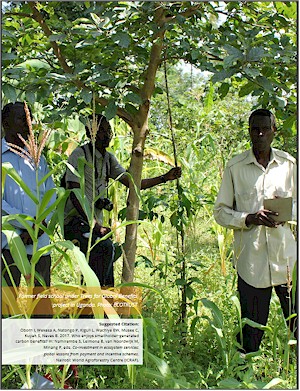| Book Chapter |
 |
|
| Title | Who enjoys smallholder - generated carbon benefits? | | Author | Ingrid Oborn, Amos Wekesa, Pauline Natongo, Lilian Kiguli, Emmanuel W Wachiye, Carolyne Musee, Shem Kuyah and Bernardete Neves | | Editors | Sara Namirembe, Beria Leimona, Meine van Noordwijk and Peter Akong Minang | | Year | 2017 | | Book Title | Co - investment in ecosystem services: global lessons from payment and incentive schemes | | Pages | 1-10 | | Call Number | BC00438-17 |
|
| Abstract: |
Climate-smart agricultural (CSA) practices that contribute to mitigation and provide adaptation measures to climate change are often mainstreamed into the agricultural development agenda. This happens regardless of incentives, since CSA practices are meant to enhance the sustainability and efficiency of smallholder agriculture. Revenue from selling environmental services such as reduced greenhouse gas (GHG) emissions and carbon sequestration (in short: carbon) can diversify incomes and contribute to the resilience of smallholder livelihoods. Crucial to this happening is the development of the carbon market and the future demand and price of these credits.
Designing payment for environmental services (PES) schemes that work sustainably in smallholder systems requires links between local action among farmer and community groups and other stakeholders at national and regional level. The farmers are the sellers who generate carbon; small farms are aggregated to cover generate quantities large enough to sell to the market. The national-and regional-level stakeholders are governments, businesses, and non-governmental organizations (NGOs) who pay for carbon credit or regulate carbon trade. |
|
|
Download file(s): Click icon to download/open file.
|
| |
File Size |
Description |

|
1967 KB |
Softcopy |
|
|
|
| Viewed in 241 times. Downloaded in 155 times. |